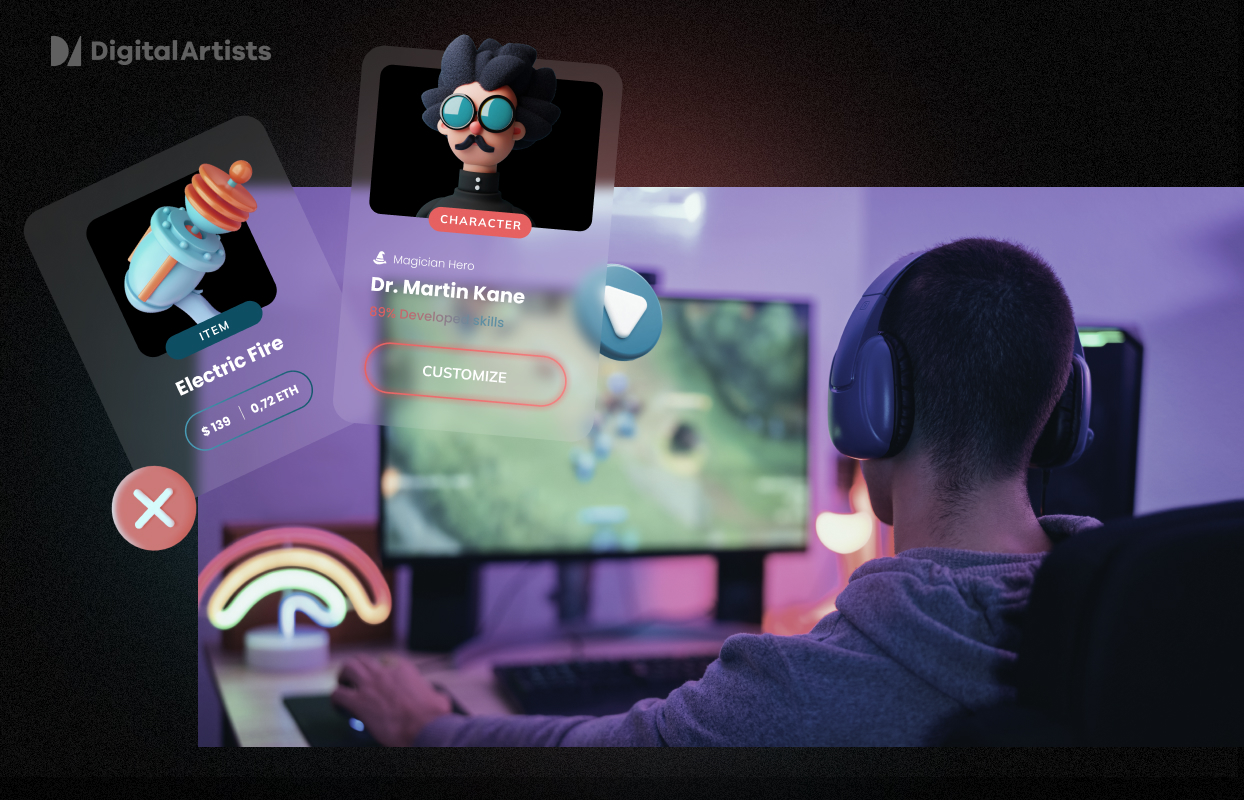


The world of gaming has long been a realm of fantasy, strategy, and adventure. It’s a space where players have fought epic battles, explored fantastical landscapes, and accumulated treasures beyond imagination. Yet, in this ever-evolving digital universe, a new revolution is taking place—one that has the potential to reshape the very essence of gaming.
With the fusion of blockchain technology and gaming, we find ourselves on the precipice of an exciting transformation. It’s a transformation that has unlocked digital assets’ true value, allowing them to be owned, traded, and cherished like physical collectibles. This transformation has been made possible through NFTs, or Non-Fungible Tokens.
NFTs are rewriting the rules of gaming, introducing novel concepts of ownership, provenance, and scarcity. In this article, we’ll journey through the uncharted territories of NFTs in gaming, discovering their profound impact on both the industry and its devoted players.
Prepare to explore how NFTs have evolved beyond buzzwords and hype to become tangible assets in the gaming world. We invite you to join us on this expedition, as we delve into the fascinating realm of NFTs, uncovering their potential, implications, and the exciting future they promise in gaming.
The gaming industry is experiencing a profound transformation, thanks to the integration of blockchain technology. This revolution has ushered in a new era where digital assets are gaining tangible value through NFTs (Non-Fungible Tokens). In this article, we’ll explore how NFTs are reshaping gaming, providing players with ownership and tradeable assets like never before. Welcome to the future of gaming, powered by blockchain and enriched by the unique potential of NFTs.
The integration of NFTs (Non-Fungible Tokens) into the gaming industry isn’t just a novelty; it brings a wide range of tangible benefits to both players and game developers. Let’s delve deeper into the advantages of NFTs and how they significantly impact the business side of gaming.
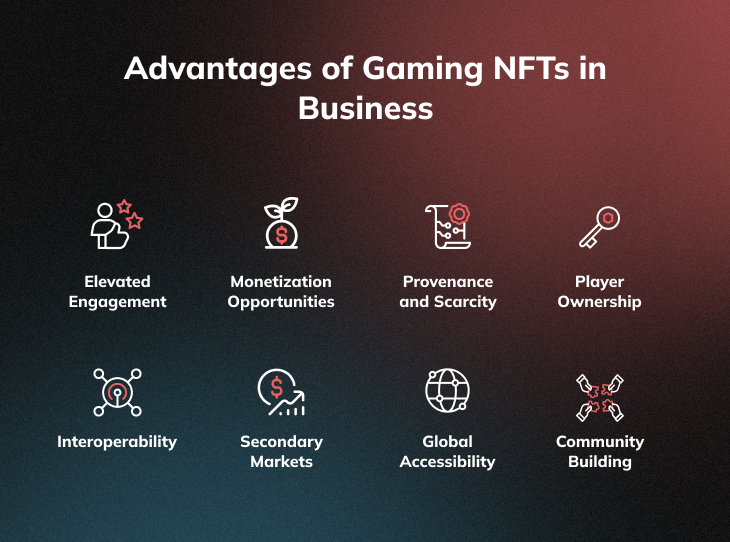
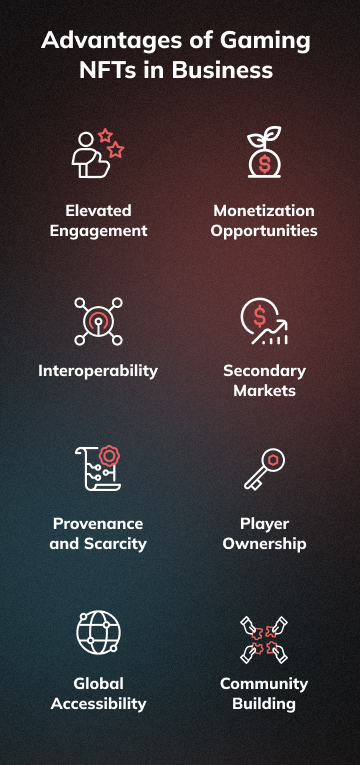
NFTs have a remarkable ability to enhance player engagement in games. These unique, tradable in-game assets offer players a sense of ownership and exclusivity, driving them to invest more time and effort into their gaming experiences. For instance, “Axie Infinity” takes full advantage of the gaming NFTs by allowing players to own, breed, and trade gaming NFTs. This not only boosts user participation but also fosters loyalty as players invest in these valuable digital assets.
Game developers can tap into a new and lucrative revenue stream by incorporating NFTs gaming perks. By selling NFTs directly to players, developers can generate additional income, potentially transforming their games into sustainable businesses. “Decentraland” is a prime example of this concept, where users purchase virtual real estate represented as NFT land parcels, creating a thriving Gaming NFTs market size for digital properties.
NFTs bring a level of scarcity and provenance to digital assets that was previously unattainable. This scarcity, along with the ability to trace the origin and ownership history of an NFT, significantly increases the perceived value of these assets. In the gaming world, rare in-game items, such as skins in “CS:GO,” have become highly sought-after NFTs due to their limited supply, driving up their market value.
Gaming NFTs empower players by allowing them to truly own their in-game assets. This concept of true ownership is exemplified by games like “Cryptokitties,” where players can breed, collect, and trade NFT cats. Each cat is a unique NFT owned by the player, making the gaming experience more immersive and personal.
NFTs are not limited to a single game or platform. They can be utilized across different games and ecosystems, creating a cross-game economy where players can carry their digital assets from one gaming world to another. “The Sandbox” offers players the ability to use NFT assets they own in one game within another, fostering an interconnected and dynamic gaming ecosystem.
The existence of a thriving secondary market for NFTs provides players with the opportunity to trade their assets. Players can buy, sell, and trade their NFTs, potentially earning a profit in the process. “Sorare” is an example where users trade virtual soccer player cards in a global secondary market, giving players an additional incentive to engage with the game.
NFTs transcend geographical boundaries, offering equal opportunities to players worldwide. “My Neighbor Alice” , for example, allows players from diverse regions to trade gaming NFTs representing virtual lands and assets in a decentralized virtual world. This global accessibility creates a more inclusive and diverse player base.
NFTs foster vibrant communities around games. Players who own and trade their gaming NFTs listed as assets often form communities where they interact, collaborate, and discuss strategies. “The Decentral Games” is an excellent example of a community that actively participates in events, governance, and discussions related to their in-game NFT properties. This sense of community enhances the overall gaming experience and helps build a loyal player base.
The integration of NFTs into gaming isn’t merely a trend; it’s a transformation that enhances the player experience and opens up new revenue streams for game developers. The synergy between NFTs and the gaming industry creates a dynamic ecosystem that’s reshaping the future of interactive entertainment, offering both players and businesses exciting opportunities.
This section explores the NFTs gaming industry and how businesses are strategically incorporating Non-Fungible Tokens into their operations to drive growth and innovation.
In the world of gaming, Non-Fungible Tokens have redefined the way players interact with digital assets and virtual environments. These unique tokens, powered by blockchain technology, have introduced a level of ownership and authenticity that was previously unattainable in the gaming landscape.
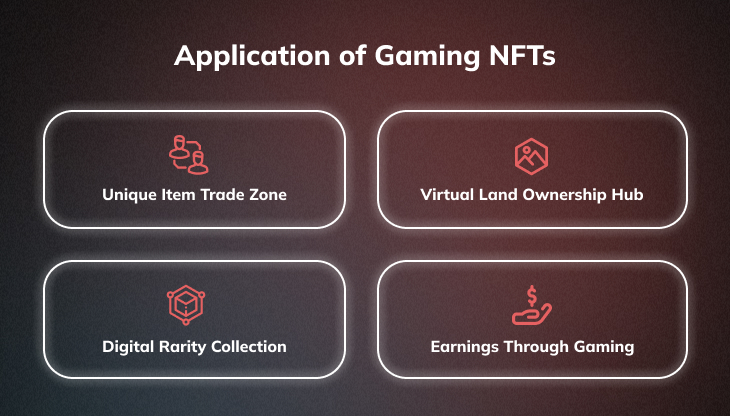
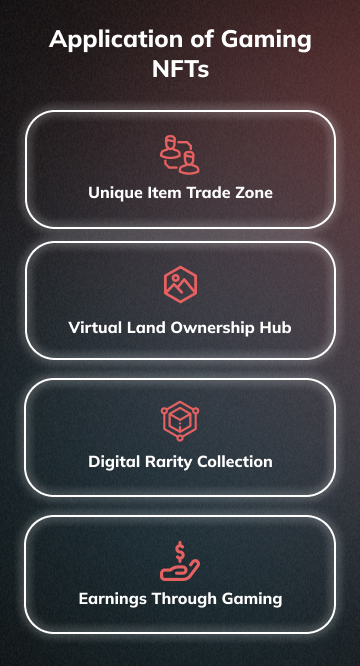
Businesses within the gaming industry are increasingly recognizing the potential of NFTs as a powerful tool to unlock the value of digital assets. The NFTs meaning in gaming is to represent ownership of unique, one-of-a-kind in-game items, and this concept has far-reaching implications for both players and game developers.
NFTs offer a novel approach to digital asset ownership, ensuring true ownership of in-game items. This means that players are not merely acquiring virtual goods; they are obtaining digital assets with real-world value. As a result, players have a vested interest in the game and its ecosystem, fostering deeper engagement and loyalty.
For businesses, the monetization opportunities are substantial. Game developers can sell NFTs to players, providing an additional revenue stream beyond traditional game sales and microtransactions. This can be a game-changer, particularly for indie game developers seeking sustainable business models. In some cases, NFTs have sold for staggering amounts, showcasing the value and demand for these digital collectibles.
NFTs bring a sense of provenance and scarcity to the gaming industry. With each NFT carrying a unique identifier on the blockchain, the history of the item is transparent and immutable. This provenance is especially crucial for high-value and rare in-game items, as it ensures their authenticity and origin, providing confidence to potential buyers.
Scarcity, another inherent feature of NFTs, elevates the perceived value of digital assets. Gamers have long sought rare and coveted in-game items, but NFTs take this concept to a new level. NFTs can be created in limited quantities, and once they are gone, they are gone forever. This scarcity drives demand and competitiveness among players, further enhancing the gaming experience.
The concept of player ownership is at the core of NFTs in gaming. Players no longer feel like mere consumers; they become stakeholders in the virtual worlds they inhabit. NFTs offer a tangible link between the digital and physical worlds, enabling players to have true ownership over their in-game assets. Whether it’s a powerful sword, a unique skin, or a virtual real estate property, players can buy, sell, and trade these assets, just like physical collectibles. Such a freedom for creativity impacts hugely the gaming NFTs market size.
Interoperability between games is another groundbreaking feature of NFTs. Players can use their NFT assets across different gaming platforms, creating an expansive, cross-game ecosystem. This not only enriches the gaming experience but also opens up new horizons for collaboration and innovation within the industry.
NFTs have brought about a paradigm shift in the gaming industry, and their impact is only beginning to be fully understood. As businesses increasingly leverage NFTs to enhance player engagement, drive monetization, and create player-owned economies, the future of gaming looks more promising and dynamic than ever before.
In the next section, we will delve into the challenges and concerns associated with NFTs in gaming, addressing issues such as environmental impact, inclusivity, and potential risks. Understanding these aspects is crucial as the gaming industry navigates this transformative landscape.
With our specialization in the NFTs gaming industry, Digital Artists offers valuable insights into the world of NFTs. Here’s where we provide assistance:
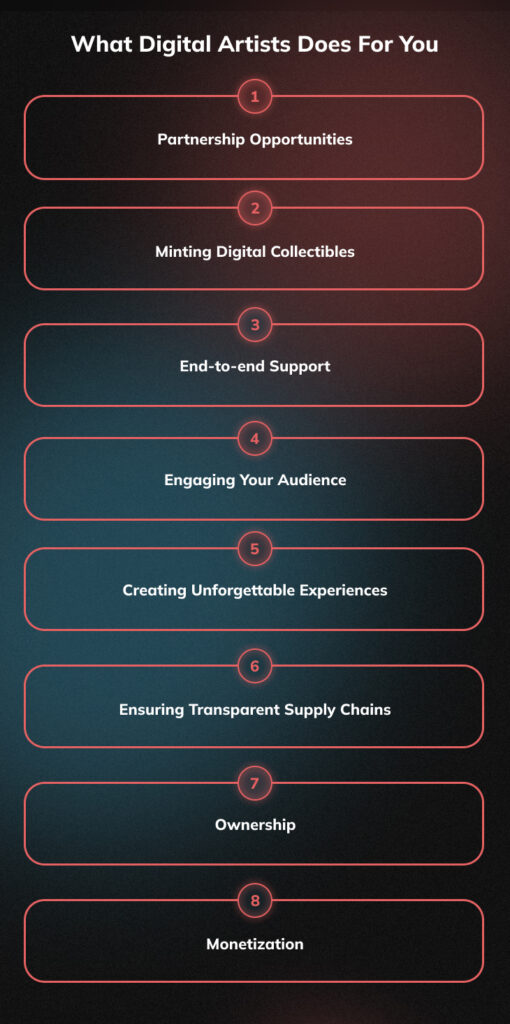

Digital collectibles and merchandise have taken on a whole new dimension with the advent of NFTs. At Digital Artists, we help clients explore the world of digital collectibles, where items are minted as unique NFTs and can be owned, bought, or traded. Whether it’s rare skins, virtual merch, or unique in-game items, the potential for creativity and monetization is vast.
NFTs can be a powerful tool to engage your audience. At Digital Artists, we assist our clients in creating NFT-based incentives that motivate customers to participate in promotional activities, tournaments, or special events. These unique digital rewards not only boost engagement but also provide a lasting, tangible connection between your brand and your audience.
With the concept of tokenized events and experiences, Digital Artists enables clients to take their virtual gatherings to a new level. From exclusive virtual concerts to in-game meet-ups, these unique experiences can be tokenized as NFTs, creating lasting memories for participants and new revenue streams for businesses.
Supply chain transparency is crucial in various industries, and gaming NFTs offer a solution. Digital Artists helps clients implement NFT-based systems that provide transparency and authenticity in their supply chains. By tokenizing products and tracking their journey on the blockchain, businesses can build trust with their customers and ensure the integrity of their goods.
At Digital Artists, we understand the importance of ownership and provenance. NFTs empower users to own digital assets like never before. Our services assist clients in tokenizing their digital goods, creating a clear and verifiable history of ownership. This fosters trust and authenticity in the virtual world.
Monetizing content has never been more creative and exciting. Digital Artists collaborates with clients to explore NFT-based content monetization strategies. From selling unique content items to creating subscription-based models, we help businesses unlock the value of their digital content and engage their audience in new ways.
Through these services, Digital Artists brings a unique blend of creativity and technology to help businesses tap into the exciting potential of NFTs in their strategies. We do so while preserving the integrity of your brand and the trust of your audience.
In the dynamic landscape of gaming, NFTs are more than just a theoretical concept; they are a transformative force that has manifested in remarkable ways. We’ve explored how NFTs empower players and businesses, redefine digital asset ownership, and enable cross-game interoperability. Now, let’s dive again into the next real-life examples that showcase the tangible impact of each NFT in the gaming industry, highlighting the best gaming NFTs projects. These instances vividly illustrate how NFTs have transcended theory and become integral to the gaming experience, enhancing engagement, fostering unique economies, and blurring the lines between virtual and real.
Illuvium’s games have revolutionized the creature battling genre by tokenizing in-game creatures as NFTs. Players truly own their digital companions, allowing them to engage in battles, earn rewards, and trade creatures with real-world value.
This play-to-earn model has garnered attention for enabling players to earn income through gameplay. It’s redefining how players interact with digital assets, transforming in-game creatures into valuable NFT collectibles.
Gods Unchained has breathed new life into the classic trading card game genre by representing each card as a blockchain-based NFT. This innovation gives players verifiable ownership of cards and the ability to trade them seamlessly.
The game has established itself as a leading blockchain-based card game, hosting high-stakes tournaments with substantial prizes. By incorporating NFTs, it has created a vibrant trading community around its unique cards.
Mobox stands at the intersection of decentralized finance (DeFi) and NFTs, introducing a novel concept where players mine NFT assets within the game, creating a captivating ecosystem of asset ownership and trade.
Their innovative approach to combining DeFi and gaming has drawn attention in the gaming ecosphere. It exemplifies how NFTs can become integral to the gaming experience and potentially create new financial opportunities for players.
Alien Worlds gamifies resource mining by incorporating NFT mining tools, where players can obtain resources as NFTs and participate in an evolving virtual mining ecosystem.
The game has succeeded in building a substantial player base, creating a dynamic system where NFT resources have real value in a virtual economy. It showcases how NFTs can extend beyond typical gaming items.
Splinterlands a leading blockchain collectible card game, has transformed virtual cards into NFTs, redefining card ownership. With 100,000+ daily players and over $20 million in NFT card sales, it’s a groundbreaking example of innovation in gaming NFTs.
This integration has reshaped the card game experience by introducing scarcity and tangible value to digital card collections, setting the standard for Gaming NFTs.
Pegaxy introduces the world of virtual horse racing as NFT assets. Players can own, breed, and race NFT horses, creating a thrilling blend of gaming and investment potential. The legendary history of animal gaming bets sets this game as one of the best NFTs in gaming projects.
The famous pegasus game has introduced a captivating concept by tokenizing horse racing assets as NFTs, allowing players to engage in virtual races while potentially profiting from the trading of valuable horse NFTs. It’s an innovative fusion of gaming and the NFT market.
These examples highlight the diverse applications of NFTs in the gaming industry, from trading card games and DeFi integration to resource mining and virtual horse racing. These innovative approaches demonstrate the versatility of NFTs in enhancing gaming experiences and creating unique opportunities for players and businesses.
The advent of NFTs in the gaming industry has brought forth a myriad of legal considerations, necessitating a deep dive into the intricate intersection of technology, digital assets, and regulations. These legal implications span a broad spectrum of issues, including intellectual property rights, smart contracts, tax liabilities, and regulatory compliance.
The use of NFTs in gaming has raised pertinent questions regarding the ownership and rights associated with in-game assets. Players, developers, and creators often interact with digital assets that may be considered intellectual property. NFTs that represent these assets bring the question of ownership and licensing into the limelight. Who holds the rights to these assets, and how are these rights transferred or licensed through NFTs?
Smart contracts underpin the functionality of NFTs. Understanding the legal implications of these self-executing contracts is crucial. It involves considerations such as the enforceability of these contracts, dispute resolution mechanisms, and the transparency and irrevocability of transactions.
Taxation: NFT transactions, including purchases, sales, and exchanges, may be subject to tax liabilities. The classification of NFTs for tax purposes, capital gains taxation, and the recording of these transactions raise complex tax questions. These issues vary across jurisdictions and must be addressed by both developers and participants in the NFT ecosystem.
Governments and regulatory bodies worldwide are actively monitoring the NFT space. Depending on the jurisdiction, NFTs might be classified as securities, collectibles, or digital assets, each subject to distinct regulatory frameworks. Navigating these regulations is crucial to avoid legal challenges and maintain compliance.
The NFT market in the gaming industry has witnessed instances of fraud and scams, from counterfeit NFTs to misleading representations. Legal challenges may arise when players, investors, or creators fall victim to fraudulent NFT schemes, necessitating measures to protect against such activities.
Collecting, storing, and sharing user data within NFT-based games introduce data privacy considerations. Compliance with data protection laws, such as the GDPR in Europe, is paramount to ensure user privacy and avoid potential legal issues.
Developers must create robust and clear terms of service and end-user agreements. These documents outline user rights and responsibilities, dispute resolution mechanisms, and legal boundaries, providing a foundational layer of legal protection.
As NFTs continue to proliferate in the gaming industry, understanding and addressing these legal intricacies is essential. Legal professionals and industry stakeholders must work collaboratively to establish clear standards and best practices, ensuring that the benefits of NFTs are realized while minimizing potential legal challenges.
NFTs are driving a seismic shift in the gaming industry, fundamentally altering how games are created, experienced, and monetized. This section explores the multifaceted ways in which NFTs are reshaping the gaming landscape, from granting true player ownership and fostering decentralized economies to revolutionizing revenue models and igniting innovative gameplay experiences.
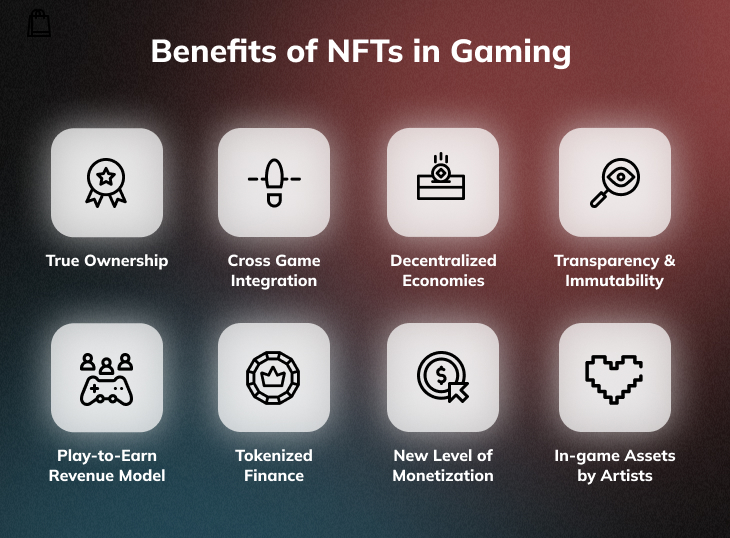
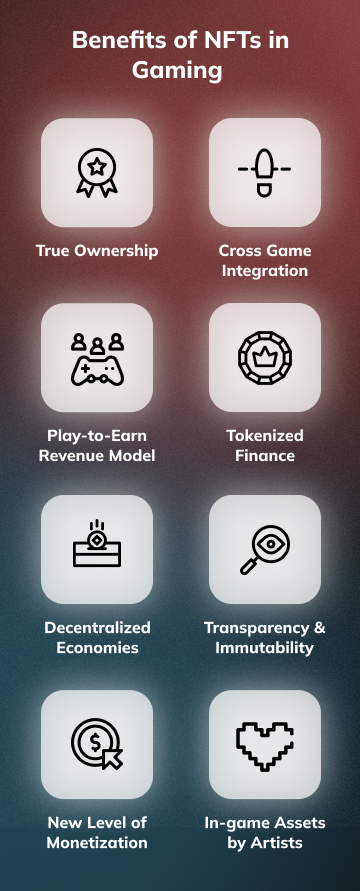
NFTs redefine ownership in gaming, allowing players to possess and trade in-game assets as unique blockchain tokens. This ownership extends beyond the virtual realm, providing players with tangible assets they can trade on secondary markets, enhancing their gaming experience.
NFTs are the catalyst for decentralized, player-driven economies where virtual assets, real estate, and governance rights are tokenized, bought, and sold. These economies give players the ability to influence and shape the gaming environment, creating a sense of community and active participation.
Game developers are embracing novel revenue models like play-to-earn, enabling players to monetize their in-game activities through NFT rewards. This shift not only incentivizes player engagement but also transforms gaming into an income-generating activity.
NFTs empower developers to monetize digital content, from in-game items and collectibles to virtual real estate, offering fresh revenue streams and creative opportunities. Content creators can tap into the NFT market, making digital art and collectibles a part of the gaming experience.
NFTs for gaming transcend boundaries, allowing assets to flow seamlessly between different gaming worlds, forging an interconnected metaverse. Players can utilize their NFTs in various games, creating a dynamic and unified gaming ecosystem.
Utilizing blockchain technology, NFTs ensure transparent and irrevocable transactions, thwarting fraud and instilling trust in virtual economies. The blockchain ledger provides a secure and traceable record of asset ownership and transactions.
Players actively engage in the governance of virtual realms and in-game assets through NFTs, fostering community involvement and ownership. This engagement goes beyond mere gameplay, allowing players to influence the development and direction of their gaming worlds.
NFTs now serve as collateral for loans and financial activities, enabling players to leverage their digital assets for real-world financial pursuits. This financial innovation creates a bridge between virtual and real-world economies.
NFTs for gaming inspire the creation of one-of-a-kind in-game assets, characters, and environments, prompting digital artists to explore uncharted creative realms. These artists contribute to the uniqueness and artistry of virtual worlds, enhancing the overall gaming experience.
These profound changes underscore the dynamic impact of NFTs on the gaming industry, introducing a future where players possess true ownership, developers explore pioneering revenue models, and virtual economies transform into decentralized, interconnected ecosystems. It’s a paradigm shift that promises to redefine the gaming experience and business models for years to come.
Welcome to our FAQ section: explore the answers of the inquiries you still hold open regarding the ever expanding industry of gaming NFTs:
In 2022, the worldwide Play-to-Earn NFT Games market was worth $3,292.73 million, and it’s projected to grow to $8,856.95 million by 2028, displaying a 17.93% Compound Annual Growth Rate (CAGR) during the 2022-2028 period.
Gaming NFT’s popularity is driven by its ability to grant players true ownership of digital assets, facilitate in-game economies, and create unique, tradable items, all powered by blockchain technology.
The revolutionary NFTs for gaming are enabling true ownership of in-game assets, fostering player-driven economies, and providing unique experiences, but also raising concerns about exclusivity and environmental impact.